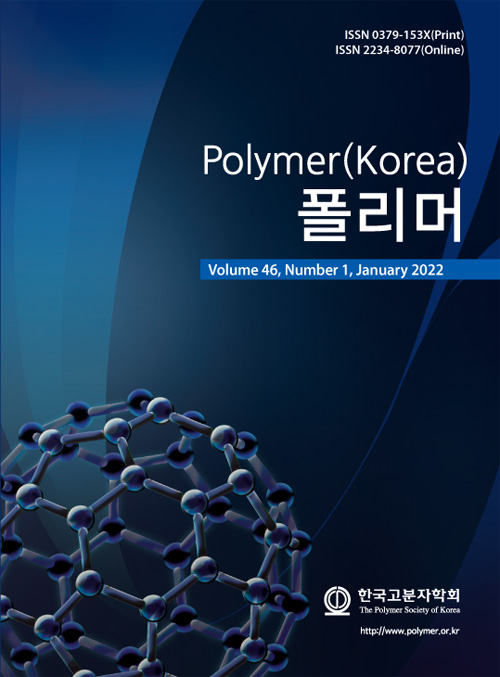- Thermoelectric Enhancement of Spark-Plasma-Sintered Cu2Te Induced by Graphene Sheets
Hyun Ju*, Dabin Park*, Minsu Kim*, and Jooheon Kim*,**,***,†

*School of Chemical Engineering & Materials Science, Chung-Ang University, Seoul 06974, Korea
**Department of Advanced Materials Engineering, Chung-Ang University, Anseong 17546, Korea
***Department of Intelligent Energy and Industry, Chung-Ang University, Seoul 06974, Korea- 그래핀에 의해 유도된 스파크 플라즈마 소결 텔루늄화 구리의 열전성능 향상
*중앙대학교 화학신소재공학과, **중앙대학교 첨단소재공학과, ***중앙대학교 지능형에너지산업학과
Reproduction, stored in a retrieval system, or transmitted in any form of any part of this publication is permitted only by written permission from the Polymer Society of Korea.
Copper telluride (Cu2Te) is theoretically a potential solid-state thermoelectric material with excellent thermoelectric performance. However, it has not achieved excellent thermoelectric performance in various copper chalcogenide-based research to data, and it is a materials with the potential to improve the performance. We suggest a promising strategy to effectively improve the thermoelectric performance of Cu2Te by introducing graphene sheets. A combination of thermoelectric properties reveals that graphene incorporation facilitates enhancing thermoelectric performance. The maximum thermoelectric ZT value of about 1.14 is achieved at 1000 K, 270% higher than for pristine Cu2Te. This strategy can provide insight that can extend copper chalcogenide-based high-performance thermoelectrics.
텔루늄화 구리(Cu2Te)는 이론적으로 우수한 열전 성능을 가질 수 있는 잠재력있는 고체상 열전 물질이다. 그러나, 지금까지의 다양한 연구들 에서는 아직 우수한 열전성능을 달성하지 못하여 왔고, 성능 개선의 여지가 있는 물질이다. 우리는 이 연구에서 텔루늄화 구리에 그래핀을 도입함으로써 효과적으로 열전성능을 향상시킬 수 있는 유망한 연구 전략을 제시한다. 열전 특성치들의 조합을 통해 그래핀 도입은 기존 텔루늄화 구리에 비해 열전성능 향상을 가능하게 한다는 것을 보여준다. 실험적으로 최고 열전성능지수 ZT 값은 1000 K의 온도에서 ~1.14를 달성하였고, 이는 기존 텔루늄화 구리에 비해 270% 향상된 수치이다. 이 연구전략은 구리 칼코겐화물 기반 고성능 열전연구에까지 확장 연구가 가능하다.
Keywords: thermoelectrics, copper telluride, graphene, solid-state material.
- Polymer(Korea) 폴리머
- Frequency : Bimonthly(odd)
ISSN 0379-153X(Print)
ISSN 2234-8077(Online)
Abbr. Polym. Korea - 2023 Impact Factor : 0.4
- Indexed in SCIE
 This Article
This Article
-
2022; 46(1): 122-126
Published online Jan 25, 2022
- 10.7317/pk.2022.46.1.122
- Received on Oct 19, 2021
- Revised on Nov 19, 2021
- Accepted on Nov 24, 2021
 Correspondence to
Correspondence to
- Jooheon Kim
-
*School of Chemical Engineering & Materials Science, Chung-Ang University, Seoul 06974, Korea
**Department of Advanced Materials Engineering, Chung-Ang University, Anseong 17546, Korea
***Department of Intelligent Energy and Industry, Chung-Ang University, Seoul 06974, Korea - E-mail: jooheonkim@cau.ac.kr









 Copyright(c) The Polymer Society of Korea. All right reserved.
Copyright(c) The Polymer Society of Korea. All right reserved.